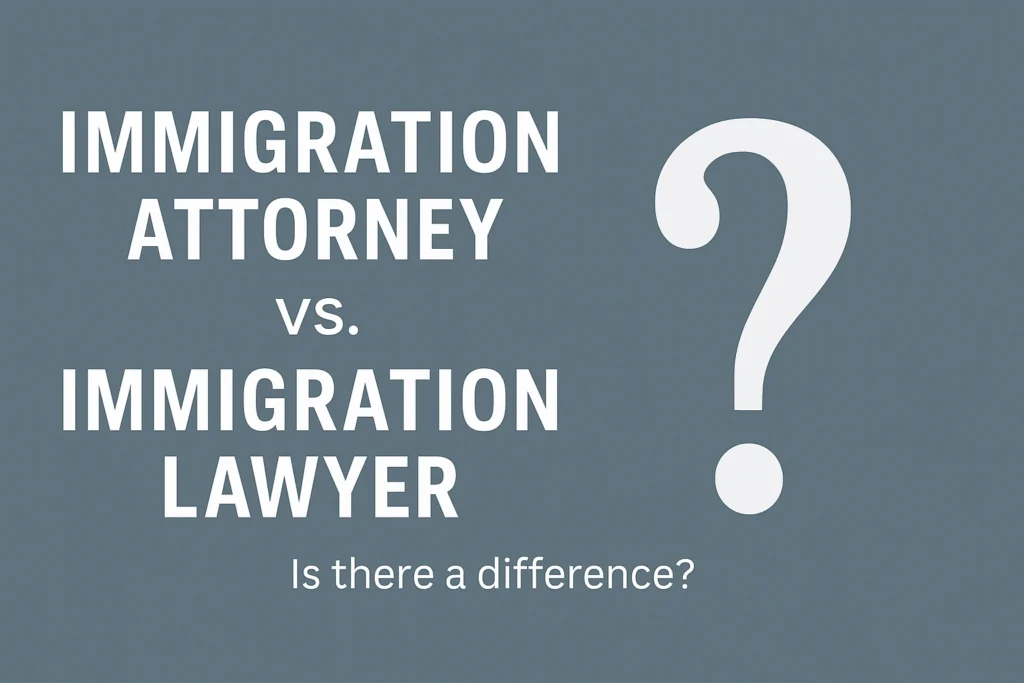Many people feel confused when they hear the words “immigration attorney” and “immigration lawyer.”
Some think they point to separate roles. Others believe one title carries more weight. This often leads to doubt before hiring legal help.
Both titles mean the same thing. Each one refers to a licensed legal professional.
Both went to law school, passed the bar exam, and can represent clients. The only difference is the word, not the role.
What Each Term Means
An immigration attorney is a licensed legal professional. This person has a law degree and the right to practice law.
Attorneys help people with advice, court cases, and immigration forms. The word “attorney” sounds formal. It often appears in legal papers and government use.
An immigration lawyer holds the same license. This person also passed law school and the bar exam.
The word “lawyer” is common in everyday talk. It feels simple and easy to use. Many people say “lawyer” when they need legal help.
There is no difference between the two. Both do the same job. Both speak in court, handle cases, and protect your rights. The title changes. The work does not.
You do not need to worry about which word to use. Focus on the person’s skill, license, and history. A good legal expert brings trust, not confusion.
One Job, Two Names
Many people ask why both terms exist. The reason comes from history and word choice. The word “attorney” comes from old legal systems.
It sounds formal and often appears in court settings. The word “lawyer” is more general. It describes anyone trained in law.
In the United States, both words carry the same legal meaning. A licensed legal expert can use either title.
Some firms use both to connect with more people. This helps when someone searches online using one term instead of the other.
No rule forces anyone to pick one title. Some lawyers change the word based on who they speak to. Others use the word that fits their own style. In the end, both names point to the same trusted role.
The Real Issue: Legal Status
The key point is not the name. It is the license. A real immigration attorney or lawyer has passed a bar exam and received permission to practice law.
This license proves that the person can handle your immigration case and speak for you before a judge or officer.
Anyone who claims to give legal advice without this license is breaking the law. Many people fall into traps because they trust the wrong person.
Some fake helpers use titles like “immigration consultant” or “notary public.” These people are not lawyers. They cannot offer legal advice or file your papers in court.
Always ask to see proof of a license. A real lawyer or attorney will never hide it. Most list it on their website or share it when you meet. You can also check the state bar website to confirm their status. This step protects you from scams and costly mistakes.
Choosing the Right Help
Picking a legal expert is a big step. It affects your future and your family. That is why you must focus on skill, not titles.
Look for someone who explains your case clearly. Choose a person who listens and answers your questions with care.
Ask how long they have handled immigration cases. Ask what types of cases they have won. Ask what steps they will take in your case. These questions tell you more than any title ever could.
You should also ask about fees. A trusted lawyer or attorney will explain their costs upfront. They will give you a written agreement. They will never ask for full payment without clear terms.
What to Avoid
Do not work with someone who makes promises they cannot keep. No lawyer or attorney can guarantee results. Immigration law is complex, and every case has risks.
Be careful if someone tells you your case is easy or fast. Real legal experts stay honest. Avoid people who use titles but do not have real training.
Some people from other countries believe a notary can act like an attorney. That is not true here. In the U.S., a notary cannot give legal advice or go to court on your behalf.
Also, avoid consultants who fill out forms but do not understand the law. Many of them cause delays, mistakes, or even deportation. Always choose someone who can back up their advice with legal knowledge and a license.
You Have Rights
As a client, you have the right to ask questions. You have the right to see a lawyer’s license.
You also have the right to clear answers and honest advice. If someone tries to rush you or avoid questions, walk away.
You should feel safe and respected. A good immigration lawyer or attorney helps you stay calm during a hard time.
They know how to work through the system and guide you through each step.
Don’t Worry About the Title
Many people still wonder what title to use. The truth is, it doesn’t matter. What matters is trust. A lawyer and an attorney are the same in the eyes of the law.
Both can help you with your visa, green card, asylum case, or citizenship process. Both can speak in court, file forms, and give advice.
So focus on who makes you feel heard. Look at their record. Read reviews. Talk to past clients if you can. Good legal help shows in action, not just in name.
Bottom Lines
Immigration cases bring pressure. You need someone who understands the law and cares about your future. The title may sound important, but it does not change the job.
An immigration attorney and an immigration lawyer do the same work. Both must pass law school, earn a license, and follow legal rules.
Choose someone who takes your case with care. Look for clear answers and honest advice. Ask questions that matter. Check their record. Use your best judgment.
The right legal help brings peace and direction. The name they use does not matter. Their skill and effort do.


